If you or a loved one is experiencing addiction, then you know it can be incredibly easy to stay inside the pattern of addictive behavior. No matter how difficult the addiction may be, taking the steps toward recovery can be extremely challenging. This complacency can create an unhealthy cycle of using substances, temporary abstinence, and relapse.
There are many top rehab centers in states across the U.S. that are well-versed in the cycle of chemical dependency and can help you out of this cycle. Read on to learn how you can overcome addiction through quality treatment.
Addiction Treatment Options
You have several addiction treatment options that offer a wide range of treatments, evidence-based and holistic care, financial obligations, and time commitments.
Here are some of the most common types of rehabilitation for substance use:
- Inpatient treatment: full-time care, typically lasting 28 to 60 days.
- Long-term residential treatment: another full-time care option lasting anywhere from three months to a year.
- Outpatient treatment: varying levels of care provided on a part-time basis in which you may return home each day.
- Sober living: a great option for those who have completed another form of treatment and want continued support among peers in recovery.
How Treatment Can Help
Below, we’ll discuss a few of the stages of the addiction cycle and uncover how an addiction treatment program can help.
Emotional Distress
Restlessness, overwhelm, boredom, anger, and frustration — each of these factors can lead to continued drug use. Whether it be from losing your job or watching someone else achieve a goal you feel you’ll never reach, any form of emotional distress can contribute to the cycle of addiction.
While challenges and failures in life do not sum you up as a person, your mind may play other games, convincing you that the event or trigger is reason enough to speak lies to yourself and drink or use drugs.
In rehab, you’ll learn to practice self-soothing and grounding techniques such as deep breathing. You’ll be surrounded by peers and addiction treatment specialists who may remind you that uncomfortable feelings are okay to have. Journaling or meditating can also help at this stage.
Cravings
Cravings are a staple of addiction. No matter where you are in your recovery journey, cravings may occur from time to time. They’ll be strong in the early stages of sobriety (this is when you’re most likely to relapse and begin the cycle over again), but lessen more and more over time.
Fortunately, in a rehab center, you will not have any access to drugs or alcohol, which will prevent you from relapsing. If you select an outpatient program, you may be more likely to succumb to cravings; however, you’ll be receiving treatment and attending therapy and group sessions daily or weekly, which will help you to manage your cravings and understand where the cravings are coming from.
Remind yourself how far you’ve come in your sober journey, and remember the things that motivate you to keep going: school, a family, financial stability, and mental well-being, to name a few.
Drug Seeking Behavior
The best way to handle drug-seeking behavior may be to put up barriers in advance. If you know that you may engage with drug-seeking behaviors again in the future, use the time when you’re not in this stage of the cycle to stop yourself before you even get there.
This is when enrolling in an addiction treatment program comes in. With the support of therapists, clinicians, caseworkers, and other professionals, you’ll be prepared to handle any obstacle that comes your way.
Before treatment, try deleting or blocking the contact information of the person you typically get drugs from. Let a friend know that you need to have them check in on you if they haven’t heard from you in a while, or if a certain event occurs that may trigger your cravings.
Withdrawal
Withdrawal symptoms can start to happen quickly, depending on the drug that’s used. But withdrawal management is always possible. Many substance use treatment centers offer detoxification services so you can safely come off of substances.
Rehab clinics can get you the medical attention and behavioral treatment you need to push through withdrawal symptoms, and come out the other side with sobriety.
Relapse
Many people seek addiction treatment because they’ve relapsed over and over again. Relapse can happen even once the cycle is seemingly broken. But if that does happen, you need to know that you are not alone.
Drug addiction is a disorder like so many others — you may have a flair-up of your symptoms from time to time. The only difference is that your symptoms are cravings, which can be very strong. If the cycle returns, and you experience relapse, it doesn’t mean you’ve failed.
As we’ve shown here, there is a point at every step in the cycle to break free. You can always begin again, no matter where you find yourself, and find relief from addiction once more.
Treatment centers will offer you an aftercare program equipped with people, resources, and step-down programs to give you the best chance at sobriety, even if you relapse again. You can create an individualized plan for continued recovery featuring 12-step groups, sober living, individual counseling, and other helpful tools for relapse prevention.

